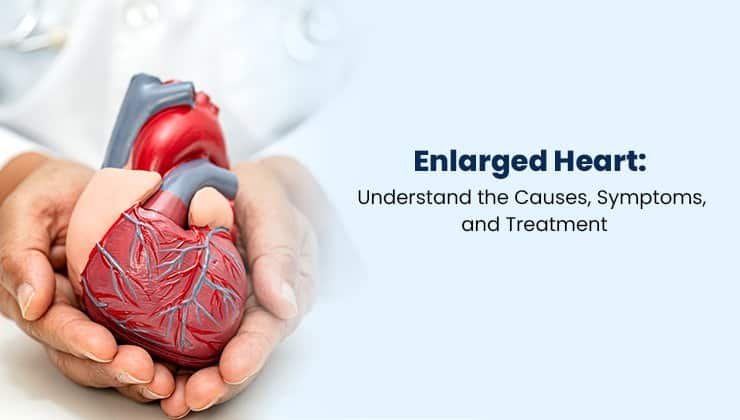An enlarged heart, also known as cardiomegaly, occurs when the heart grows larger than its normal size. The heart may enlarge to compensate for an increased workload, but it may also lead to complications. Understanding the causes, symptoms, diagnosis, and treatment options is necessary for effective management and prevention of associated risks.
Read on to explore more about an enlarged heart, causes, symptoms, treatment, and much more!
Understanding Cardiomegaly
Cardiomegaly, commonly known as an enlarged heart, is a medical condition characterized by an increase in the size of the heart. This enlargement is not a disease itself but rather a sign of another underlying condition that puts strain on the heart muscle and affects the heart’s ability to pump blood efficiently.
It can be temporary or permanent, depending on the condition and may result in congestive heart failure.
Causes And Risk Factors Of Cardiomegaly
An enlarged heart may be caused due to damage to the heart muscle by the conditions that make the heart pump harder. In a few instances, short-term stress on the body, including pregnancy, may also cause the heart to get larger.
Several diseases that are associated with an enlarged heart include
- Congenital heart defect: Problems associated with the structure and function of the heart, causing the heart muscle to become enlarged
- High blood pressure: If the person has high blood pressure, the heart may have to pump harder, causing the heart muscle to grow larger and become weak
- Cardiomyopathy: Diseases of the heart muscle may lead to enlargement
- Pericardial effusion: Fluid buildup in the sac around the heart may cause heart enlargement
- Heart valve disease: Disease or damage to the valves may interrupt blood flow and cause the heart chambers to become larger.
- Thyroid problems: Both hypothyroidism and hyperthyroidism may lead to an enlarged heart
- Hemochromatosis: Excess iron buildup in different organs may cause the lower heart chamber to swell.
The different risk factors that may increase the chance of an enlarged heart include
- Heart diseases
- High blood pressure
- Family history of heart muscle disease
- Sedentary lifestyle
- Consumption of large amounts of alcohol
Symptoms Of Cardiomegaly
In some individuals, cardiomegaly causes no signs or symptoms. Few may show symptoms, including
- Shortness of breath, especially while lying flat or waking up
- Fatigue and weakness
- Coughing when lying down
- Fatigue or extreme tiredness
- Palpitations or irregular heart rhythm, known as arrhythmia
- Swelling in the abdomen or legs
- Feeling full after eating just a little
How To Diagnose Cardiomegaly?
The different tests that are done by the healthcare professionals to help diagnose cardiomegaly include
- Physical examination to detect signs of heart enlargement
- Blood tests to check for underlying conditions, including thyroid disorders or infections
- Chest X-ray to show the condition of the lungs and heart
- An electrocardiogram measures the electrical activity of the heart
- Echocardiogram to determine how well the heart is working
- Exercise tests or stress tests to monitor the heart while walking on a treadmill
- CT or MRI to provide detailed images of the heart’s structure
- Cardiac catheterisation to diagnose and treat cardiovascular conditions
Complications Of Cardiomegaly
Cardiomegaly may lead to several serious complications if left untreated, including
- Heart failure where the heart can’t pump the proper amount of blood throughout the body
- Blood clots that form in the lining of the heart
- A leaky heart valve may prevent the mitral and tricuspid heart valves from closing
- Cardiac arrest
- Sudden death
How To Treat Cardiomegaly?
The treatment of an enlarged heart may vary depending on the type of heart problem. It includes
- Medications: Your healthcare provider may prescribe diuretics, blood thinners, heart rhythm drugs, and other blood pressure drugs.
- Surgery: Surgery may be required if the medications are not enough to treat an enlarged heart. It includes a pacemaker, an implantable cardioverter-defibrillator (ICD), heart valve surgery, coronary bypass surgery, left ventricular assist device, and heart transplant.
- Lifestyle changes: Adopting a heart-healthy diet low in sodium, regular exercise, weight management, limiting alcohol, and quitting smoking may help improve quality of life.
How To Prevent Cardiomegaly?
The different lifestyle factors that may help prevent an enlarged heart are
- Monitor and manage different conditions, high blood pressure, high cholesterol, and diabetes by having regular health check-ups
- Incorporate heart healthy diet
- Getting adequate rest
- Avoid alcohol intake
- Avoid smoking
- Adhere to medications as prescribed by doctors
- Engage in regular exercise that strengthens the heart
Adopting these lifestyle changes may reduce the risk of developing an enlarged heart.
When To See A Doctor?
It is preferable to call your local emergency number or a healthcare professional if you notice any signs and symptoms, including
- Chest pain
- Severe shortness of breath even at rest
- Fainting
- Discomfort in the upper parts of the body, including the back, neck, jaw, or stomach
If you have high blood pressure, diabetes, or a family history of heart disease, it is preferable to consider setting routine appointments with a healthcare provider to monitor the potential changes that may be taking place in the heart.
Conclusion
Cardiomegaly is a medical condition that signals different underlying conditions, including high blood pressure, heart disease, or structural abnormalities. It may lead to complications, including heart failure or arrhythmias, if left untreated, and so, early diagnosis, effective treatment, and lifestyle changes may improve outcomes.
If you or your loved one has been diagnosed with cardiomegaly, feel free to book an appointment with Dr Nikhil of Heart360 Care for a holistic, patient-centred approach!
Frequently Asked Questions
Yes, cardiomegaly may return even after the enlarged heart treatment if it is not well managed. Regular monitoring and lifestyle changes after the enlarged heart treatment are required for managing the condition and preventing further complications.
Yes, an enlarged heart may get smaller and return to its usual size after treatment, especially if it is caused by temporary factors, including pregnancy or an infection. However, if the heart muscle is severely damaged or the condition is chronic, the enlargement may not fully reverse, but the symptoms may improve significantly.
The different lifestyle changes that may play a major role in managing cardiomegaly and preventing its progression include following a heart-healthy diet, limiting alcohol, avoiding smoking, exercising regularly, maintaining a healthy weight, monitoring and controlling blood pressure, managing stress, taking medications as prescribed, and limiting caffeine.
The life expectancy for someone with an enlarged heart may vary widely depending on the underlying cause of the condition, severity, and how effectively it is managed. It may be shorter in person with advanced heart failure or severe cardiomyopathy. If properly treated and with regular monitoring, healthy lifestyle habits, and treatment adherence, it may significantly improve outcomes.









